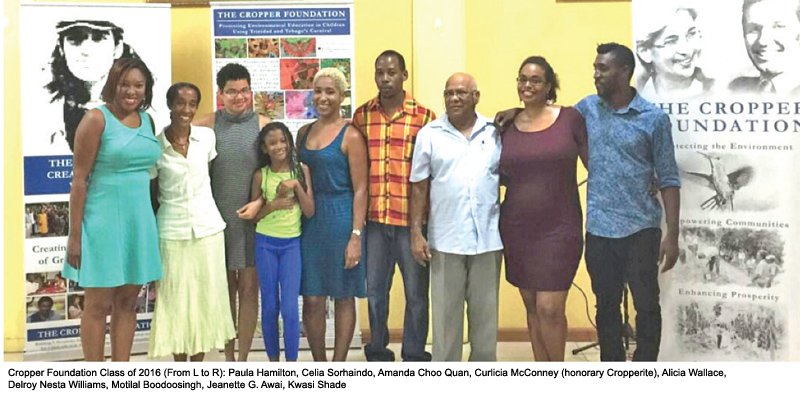|
September 2016

Issue Home >>
|

Three weeks of writing and being critiqued by a group of strangers in the middle of nowhere with no meat, alcohol or caffeine - how would this hedonist survive? That was my second thought on realising I was selected to participate in Beyond Expectations – The Cropper Foundation Caribbean Writers’ Residential Workshop 2016 for prose, fiction, poetry and playwriting development in Balandra.
I’m happy to report that my initial trepidation evaporated and the overall experience was indeed ‘beyond expectations’ and met the elation of my first thought about being in the programme. Where food was concerned, I ended up having some of the best meals, vegetarian or otherwise, during that time which was prepared by chef Carrol McConney and her staff. Picture crispy baigan rounds; roasted ochro with homemade coconut bake and creamy spiced porridge so good it could render you speechless and that was just the breakfast menu. I was not alone in my adulation of the sweet hands that fed us. Many a meat-mouth in our group became vegetarian converts, even if only for three weeks. The role of food throughout the workshop undoubtedly gave us the fuel we needed for our rigorous daily critique sessions.
Every year the writing programme welcomes writers at all stages of their literary endeavours and my group spanned the gamut of life experiences. Among the eight diverse people in the group, there was a retired engineer turned published writer, a Bahamian LGBT and women’s rights activist, an MFA student and I - a corporate communications writer. Literary veterans, Professor Emeritus Funso Aiyejina and former Lecturer and Dean of Humanities and Education, Dr Merle Hodge, led the roundtable critical discussions. These were centered on a designated person’s submission for which in-depth criticism was required.
Critic was one role, with the flipside of that being writer, arguably the more difficult of the two as it was not easy to hear that your writing did little for your audience. However, you were left with a greater understanding of why and what tools you could use to reach the audience you intended. Surprisingly, everyone took their critiques well, so much so we were praised for it. Our egos took a beating, but we were made stronger writers for it.
The logistics of managing a group of people in a remote location while printing submissions, scheduling meals, arranging field trips and ensuring things run smoothly requires a dedicated team of professionals working around the clock and that was housed in one body belonging toDr Danielle Lyndersay, former Head of the Department of Creative and Festival Arts (DCFA). She was “den mother” and the greatest source of energy for our group who worked tirelessly and efficiently to make sure that we got the ultimate Cropper experience.
Dr Lyndersay, a drama professor by trade and seemingly a magician all other time, was always trying to find sources of funding for the programme. The value of programmes like Cropper that helps in the creation of new Caribbean literature was repeatedly underscored by our guest lecturers Dr Elizabeth Walcott-Hackshaw, Barbara Jenkins, Rhoda Bharath and Sharon Millar.
Being part of the Cropper Foundation taught me that there is no blueprint for what a Caribbean writer should write about. One of the best lessons from the Workshop is that my writing voice was valid and would reach my audience once I committed myself to the discipline of writing and reading widely. In an open microphone “readout” that was held at the legendary Arthur’s Bar, members of the Toco community participated by singing, reading their works of fiction and share freely their personal stories. The Cropper Foundation taught me that we owe it to ourselves to tell and celebrate our stories as only we can.

 About the Cropper Foundation About the Cropper Foundation
The Cropper Foundation is a not-for-profit philanthropic organisation committed to Caribbean development across a range of disciplines and sectors. A family foundation of modest resources, the Foundation seeks to catalyse activities in its various programmes by bringing together other like-minded individuals and organisations to work towards common objectives that contribute to the public good. Through its support for Caribbean writers programme, The Cropper Foundation seeks to contribute to the literature of the region by creating opportunities for instruction, appraisal and intellectual debate for aspiring writers. Undertaken in partnership with the Department for Creative and Festival Arts, UWI, a series of workshops have given emerging writers the benefit of the guidance of established writers and scholars like Merle Hodge, Funso Aiyejina, Rachel Manley, Earl Lovelace, and Ken Ramchand. For more on the Cropper Foundation Residential Workshop for Writers, please visit their Facebook Page.
Jeanette G. Awai is a writer who is on a steady literary diet. To find out how she stays so fit, please email jeanette.awai@sta.uwi.edu. |





